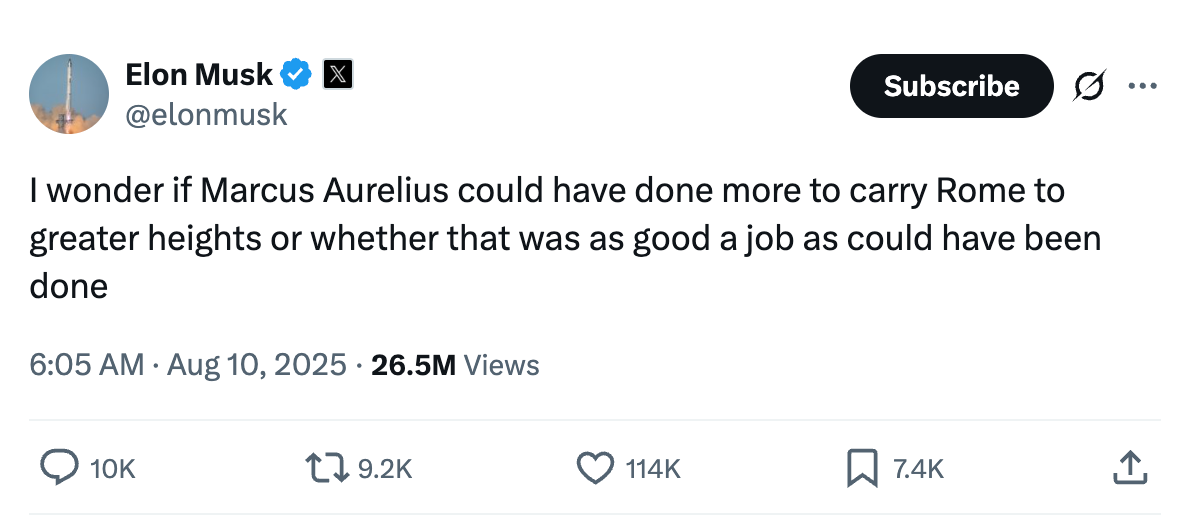Elon Musk questions Marcus Aurelius
Did Marcus Aurelius do enough for Rome?
Earlier this week the controversial character and businessman Elon Musk asked:
It’s an interesting question. Likely one that would have weighed on the Roman emperor.
But one of the most striking things about the first chapter of Marcus’ Meditations is that it is focused on character traits not results. The entirety of it is made up of what the Stoic emperor learned from others and what he admires about them.
Here’s how he described his adoptive father and former emperor, Antoninus Pius:
In my father I observed mildness of temper, and unchangeable resolution in the things which he had determined after due deliberation; and no vainglory in those things which men call honours; and a love of labour and perseverance; and a readiness to listen to those who had anything to propose for the common weal; and undeviating firmness in giving to every man according to his deserts; and a knowledge derived from experience of the occasions for vigorous action and for remission.
Meditations 1.16
The focus isn’t on how Antoninus Pius brought the Roman Empire to greater heights. It’s on who he was. That’s the emphasis – and it is perfectly in line with Stoicism.
Indeed, it’s worth questioning whether Marcus Aurelius would have seen carrying “Rome to greater heights” as worthwhile. He questions the value of glory throughout Meditations. Here he is on former emperors:
This is the chief thing: Be not perturbed, for all things are according to the nature of the universal; and in a little time you will be nobody and nowhere, like Hadrian and Augustus.
Meditations 8.5
Whatever heights the Roman Empire achieved, it would disappear like so many of the empires before it.
Even so, Marcus Aurelius likely saw promoting Rome’s interests as one of his key roles as a Roman and official. And though it’s true that, as a cosmopolitan, he would have seen another one of his roles to be a citizen of the universe, he was a Roman too:
But my nature is rational and social; and my city and country, so far as I am Antoninus, is Rome, but so far as I am a man, it is the world.
Meditations 6.44
Marcus Aurelius possessed the cosmic role of human being, but also the specific roles of Roman, emperor, friend, father, and adopted son. How to balance those is a careful philosophical matter.
Every moment think steadily as a Roman and a man to do what you have in hand with perfect and simple dignity, and feeling of affection, and freedom, and justice; and to give yourself relief from all other thoughts.
Meditations 2.5
The core issue for Marcus Aurelius was not how great Rome can be but how great he can be – and not in the sense of glory or status, but in virtue. That said, his unique excellence would have been shown in his role as ruler. That is the part the universe chose for him. So the question: “am I doing as good a job as I could be” must have weighed on him. What happened in the Roman Empire was ultimately not up to Marcus Aurelius, but his ability to make excellent decisions was.
As the last of the good emperors, historians generally give Marcus Aurelius high marks. They have also spoken well of his character. These aren’t so easy to separate, but to the extent that they are he would have taken the latter to be more important.
And further, let the deity which is in you be the guardian of a living being, manly and of ripe age, and engaged in matter political, and a Roman, and a ruler, who has taken his post like a man waiting for the signal which summons him from life, and ready to go, having need neither of oath nor of any man's testimony.
Meditations 3.5
Perhaps the real question Musk should have asked of Marcus Aurelius is whether he did enough to carry himself to greater heights. Was he as good as he could have been? More importantly, he should ask that of himself. And we can follow in that inquiry.
And here’s Donald J. Robertson ’s take on the question:
Do check out his Substack if you haven’t already: Stoicism: Philosophy as a Way of Life


